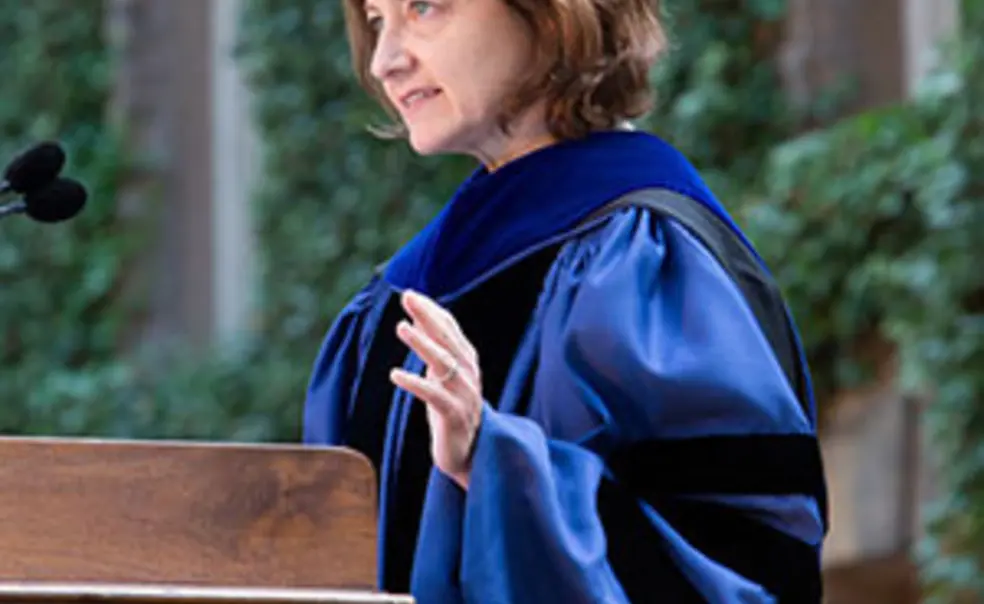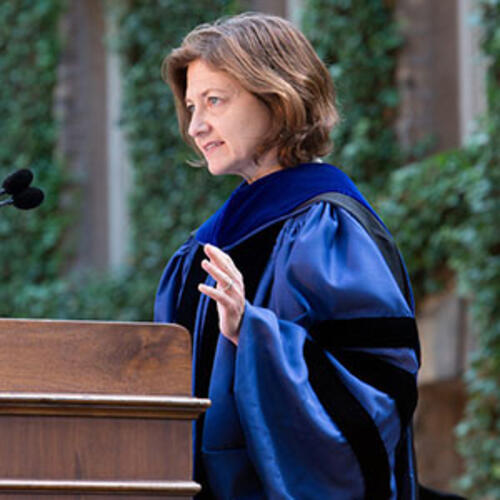Installation Remarks by Professor Deborah Prentice
Deborah Prentice, the Alexander Stewart 1886 Professor of Psychology and Public Affairs and chair of the psychology department, delivered the following remarks at the installation of President Christopher Eisgruber ’83 Sept. 22.
It is truly a privilege and an honor to speak on this glorious first day of fall at the installation of President Christopher Eisgruber. My role here is to speak for the faculty, so let me begin, in true faculty-member form, by disavowing that role. I have neither the authority nor the temerity to speak for the Princeton faculty. I speak instead from the faculty, as a faculty member in the psychology department and the Woodrow Wilson School, and as a seasoned department chair.
Of the many relationships that make up this great university, one of the most important – perhaps the most important for achieving institutional goals – is the relationship between the administration and the faculty. Let me make two observations about that relationship at Princeton. One, I think the relationship is much more congenial here than at most other colleges and universities – indeed, it is much more congenial. Two, we almost never examine or interrogate the relationship. Now these two observations may be causally connected in a variety of ways, and it is quite possible that I should take seriously the wisdom of the second observation and just stop talking now. But I am going to go on for another minute or two, because I think there are different ways of achieving congeniality, and some are better than others.
The dominant view of faculty-administration relations is that it is rather like the relationship between cats and cat-herders. Faculty members are the cats – negatively disposed to authority figures, independent-minded, and unresponsive to any and all efforts to control their behavior. Administrators (usually department chairs, but also Deans, Provosts, and, yes, even Presidents) are the herders, trying to get faculty members to do their part so the academic trains will run on time. This feline metaphor is shockingly prevalent in the academy, and it’s always offered up with a kind of bemused shake of the head and shrug of the shoulders, by faculty and administrators alike. “Work with the faculty? It’s like herding cats, you know.”
Now I can’t quarrel with the metaphor – I have way too much experience as a department chair to doubt its validity – but like any metaphor, it offers only a partial view. It captures certain, undeniable truths about the faculty, but leaves other truths out. For example, it leaves out the fact that some of these very same cats – the ones who won’t show up for a meeting, respond to an email, or turn in their grades on time – will work like dogs to develop a center that makes Princeton the place for a certain field of scholarship; or to run a lab that trains generations of young scientists, many of them women and underrepresented minorities; or to teach one of the first Coursera courses; or to help design benefits programs so that Princeton staff members can make the best possible decisions about their health and well-being. I have specific individuals in mind with each of these descriptions – these are cats I have known – and while I would not claim that all faculty members have the potential and inclination to contribute to the university’s broader mission in these ways, I think many do. Moreover, as these examples illustrate, great things can happen when faculty and administrators work together for the good of the university. Indeed, I would go further to say that great things can happen only when faculty and administrators work together.
So back to congenial relationships. It is very easy to have a congenial relationship with a cat. You feed the cat, go about your business, and occasionally the cat will come rub your legs or sit on your lap. This is congeniality grounded in compatible goals and low expectations, the hallmark of a good, cat-human relationship. When it comes to faculty-administration relationships, some might advocate for a similar model. I remember when I first came to Princeton and asked about the relationship my department had with the administration, a colleague told me, “It’s great. They support us and leave us alone.” I don’t think we have to settle for that kind of congeniality. A truly great relationship between faculty and administration is grounded in common goals and partnership. That is the kind of relationship that will inspire the unherdable cats to work like dogs for the good of Princeton University. The broad goals that President Eisgruber has outlined for this university – that it be at the forefront of engaged scholarship and teaching, a leader in higher education; that it foster a service orientation and make itself accessible to the broadest possible range of students and scholars – these are goals the faculty shares. They are goals that I am confident we can achieve, working together.













No responses yet